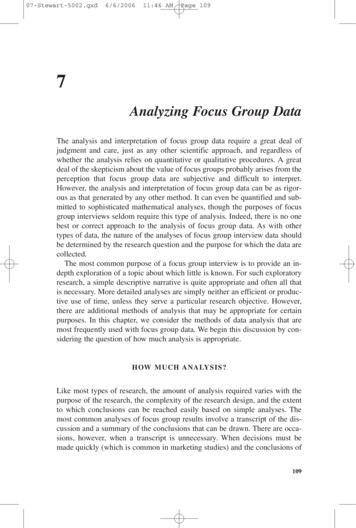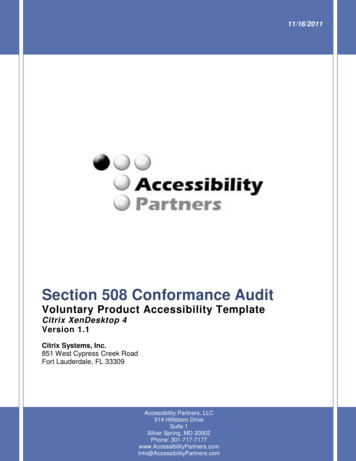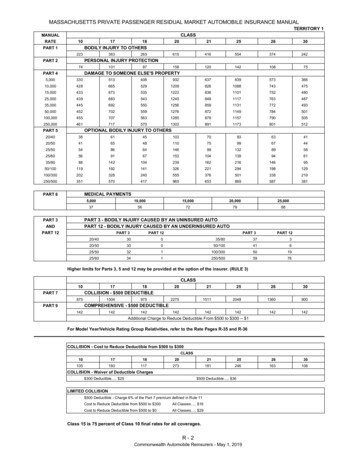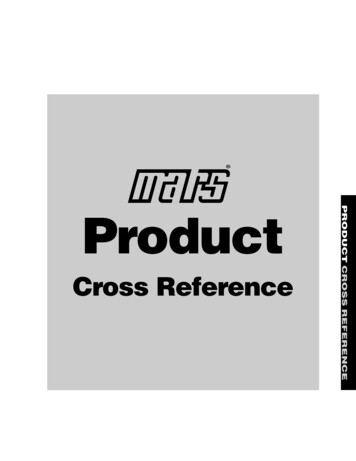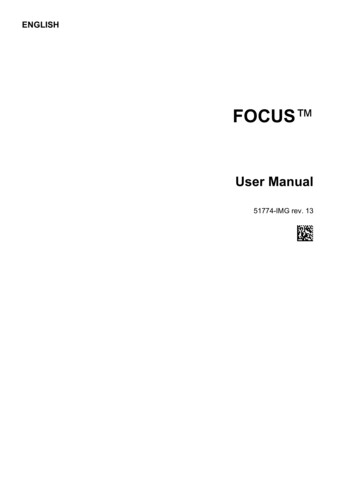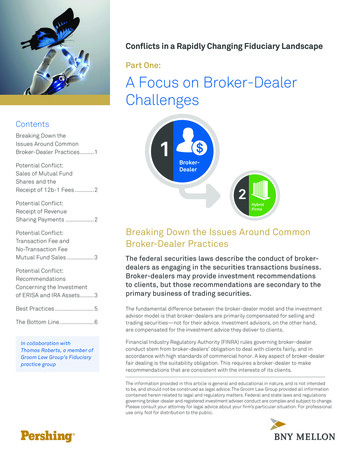
Transcription
Conflicts in a Rapidly Changing Fiduciary LandscapePart One:A Focus on Broker-DealerChallengesContentsBreaking Down theIssues Around CommonBroker-Dealer Practices.1Potential Conflict:Sales of Mutual FundShares and theReceipt of 12b-1 Fees.2Potential Conflict:Receipt of RevenueSharing Payments.2Potential Conflict:Transaction Fee andNo-Transaction FeeMutual Fund Sales.3Potential Conflict:RecommendationsConcerning the Investmentof ERISA and IRA Assets.3Best Practices.5The Bottom Line.6In collaboration withThomas Roberts, a member ofGroom Law Group’s Fiduciarypractice group1BrokerDealer2HybridFirmsBreaking Down the Issues Around CommonBroker-Dealer PracticesThe federal securities laws describe the conduct of brokerdealers as engaging in the securities transactions business.Broker-dealers may provide investment recommendationsto clients, but those recommendations are secondary to theprimary business of trading securities.The fundamental difference between the broker-dealer model and the investmentadvisor model is that broker-dealers are primarily compensated for selling andtrading securities—not for their advice. Investment advisors, on the other hand,are compensated for the investment advice they deliver to clients.Financial Industry Regulatory Authority (FINRA) rules governing broker-dealerconduct stem from broker-dealers’ obligation to deal with clients fairly, and inaccordance with high standards of commercial honor. A key aspect of broker-dealerfair dealing is the suitability obligation. This requires a broker-dealer to makerecommendations that are consistent with the interests of its clients.The information provided in this article is general and educational in nature, and is not intendedto be, and should not be construed as legal advice. The Groom Law Group provided all informationcontained herein related to legal and regulatory matters. Federal and state laws and regulationsgoverning broker-dealer and registered investment adviser conduct are complex and subject to change.Please consult your attorney for legal advice about your firm’s particular situation. For professionaluse only. Not for distribution to the public.
That obligationtowards “fairdealing” iscreating pressureto re-evaluate andre-structure existingcompensationpractices.That obligation towards “fair dealing” is creating pressure to re-evaluate andre-structure existing compensation practices. The pressure springs frommultiple sources:›› Dodd-Frank mandates that the Securities and Exchange Commission developuniform standards of care for broker-dealers and investment advisors›› The Department of Labor’s (DOL) concern that additional layers of regulatoryprotection are needed to safeguard the interests of retirement savers.While the outcomes of the Dodd-Frank mandate and the DOL’s proposal remainuncertain, for the foreseeable future, broker-dealer firms are likely to experienceincreasing pressure to demonstrate that they have policies and procedures thatidentify and prevent conflicts of interest. Let’s discuss some of the common practicesthat we believe to be potential conflicts.Potential ConflictSales of Mutual Fund Shares and the Receipt of 12b-1 FeesBroker-dealers often receive 12b-1 fees as compensation for sales resulting fromrecommendations of mutual funds to clients. Regulatory scrutiny of the processinvolved in developing the recommendations that generate 12b-1 fee compensationis likely to intensify.›› Broker-dealers need to be prepared to explain the process used to determine whichmutual funds have been approved for sale to clients.›› Firms should be able to explain their due diligence process for product review andapproval, and how the products approved for sale are anticipated to be used to meetparticular client needs.›› These firms should demonstrate the process for supervisory review of the fundsthat representatives have recommended to clients with a view to whether thoserecommendations are aligned to meet client interests.Potential Conflicts and Solutions2Sales of Mutual Fund Sharesand the Receipt of 12b-1 FeesReceipt of RevenueSharing PaymentsFirms should be able to explain theprocess used to determine which mutualfunds have been approved for sale, thedue diligence process for product reviewand approval and their process for thesupervisory review of funds.Any revenue sharing arrangements mustbe disclosed to clients and prospects.Firms must determine whether thearrangement presents an inappropriateconflict of interest.
While 12b-1 fees are an important element of brokerage firm compensation, FINRAis interested in the firm’s policies and procedures for monitoring all elements of thefirm’s compensation model, as well as the splits between the firm’s compensationand the compensation received by registered representatives.Potential ConflictReceipt of Revenue Sharing PaymentsCertain fund companies make revenue sharing available to broker-dealers. Thistypically involves payments by the mutual fund’s investment advisor or distributorfrom its own resources. Unlike 12b-1 fees, revenue sharing payments are not directlyderived from the fund itself. Generally, revenue sharing payments are a percentage ofbroker-dealer client assets invested in a particular fund (i.e., 5 basis points (0.05%) ofaverage monthly assets).While revenue sharing arrangements are not unusual, broker-dealers need to carefullyand thoughtfully decide to accept revenue sharing payments:››Broker-dealers need to consider the purpose of the payments.›› Many broker-dealers accept revenue sharing payments to offset the costs ofregistered representative education and training on funds that are useful in servingclient needs. If the arrangement is for purposes other than training and education,the firm should consider whether the arrangement presents an inappropriate conflictwith client interests.›› Any revenue sharing arrangements must be disclosed to clients andprospective clients.Many, if not most, broker-dealers with revenue sharing relationships, prominentlydisclose the names of the fund families, the purpose of those arrangements, and thatthe firm tends to concentrate its sales efforts on those fund families that maintainrevenue sharing relationships with the firm. In addition, many broker-dealers publisha ranking of their mutual fund revenue sharing arrangements by identifying fundfamilies according to the amount of revenue sharing paid.Transaction Fee andNo-Transaction FeeMutual Fund SalesBroker-dealers should ensure thatthere are policies and procedures forsupervision and that recommendationsare not influenced by compensationconsiderations.Recommendations Concerning theInvestment of ERISA and IRA AssetsBroker-dealers must adhere to fiduciarystandards of conduct and FINRA rules,including prohibited transaction avoidancerules under ERISA and the Internal RevenueCode. Firms can work with their legal counselto develop and use strategies to take advantageof prohibited transaction exemption relief.Part One: A Focus on Broker-Dealer Challenges3
It is important to consider: the extent to which revenue sharing relationships withfund families may give rise to inappropriate conflicts of interest when it comes to salesrecommendations made by the firm’s registered representatives. FINRA has suggestedthat, as a best practice, registered representatives not participate in revenue sharingwith their broker-dealers.Potential ConflictTransaction Fee and No-Transaction Fee Mutual Fund SalesMany broker-dealers offer transaction fee and no-transaction fee (NTF) funds toclients. The differences in the way the broker-dealer is compensated on transactionfee and NTF fund offerings can be seen as a conflict of interest. Depending on the sizeof a client’s investment and the anticipated length of the holding period, the firm mayearn more compensation if the client purchases a NTF fund rather than a transactionfee fund (or vice versa).To avoid conflict or the appearance of conflict, a broker-dealer should make sure ithas policies and procedures for supervision that ensure recommendations are notinfluenced by compensation considerations.Potential ConflictRecommendations Concerning the Investment ofERISA and IRA AssetsIt is importantto note that IRAsare consideredindividual plansand are subject tothese rules.Individuals and firms that act as fiduciaries when making investmentrecommendations with respect to IRAs and ERISA plans are subject to the brokerdealer standards of conduct and FINRA rules. They are also subject to the fiduciarystandards of conduct and prohibited transaction avoidance rules under ERISA andthe Internal Revenue Code. Those standards of conduct are particularly intolerant ofconflicts of any kind. Prohibited transaction exemptions must be adhered to in orderto receive compensation that would otherwise be considered prohibited due to conflict.These exemptions are often highly detailed and technical.The DOL has proposed some dramatic changes to the regulations that define whenan individual advisor or firm is acting as a fiduciary. If adopted, those changes coulddramatically change firm business models.Under current law, the DOL’s regulations utilize a five-part test to determine thecircumstances under which someone will be deemed a fiduciary by renderinginvestment advice for compensation. It is important to note that IRAs are consideredindividual plans and are subject to these rules. Under the current law:4
An ERISA fiduciaryis someone who providesinvestment advice for afee, if he or she:1. makes recommendations as to the advisability of investing in,purchasing or selling securities or other property, or gives adviceas to their value,2. on a regular basis,3. pursuant to a mutual agreement, arrangement or understanding,with the plan or a plan fiduciary, that4. the advice would serve as a primary basis for investment decisionswith respect to plan assets, and that5. the advice is individualized based on the particular needs of the plan.The determination of fiduciary status is critical. An ERISA fiduciary is not allowedto engage in transactions where he or she has a conflict of interest, unless therequirements of a specific prohibited transaction exemption can be satisfied. UnderERISA, disclosure alone does not resolve conflicts. Conflicts of interest for ERISAfiduciaries include:››Self-dealing (i.e., a transaction in which the fiduciary has a financial or other interest)›› Receiving kickbacks (i.e., payments from a third party in connection with aplan transaction)Many broker-dealers today take special precautions to avoid ERISA fiduciary statuswhen providing investment recommendations to clients with respect to IRA andqualified plan accounts. For example, many broker-dealers make sure their clientsacknowledge that their broker does not provide investment advice under ERISA and thatany recommendations made should not serve as the primary basis for decision-making.In circumstances where a broker-dealer does provide recommendations as a fiduciaryto qualified plans and IRA accounts, special precautions are required. The objective isto make sure that any compensation received for those recommendations does notlead to a violation of the prohibited transaction rules under ERISA and the InternalRevenue Code. This includes the prohibitions against fiduciary self-dealing. In manycases, broker-dealers seek to avoid potential conflicts in these situations by levelingtheir compensation and rebating to client accounts amounts that may exceed the levelagreed upon. Prohibited transaction exemptions issued by the DOL may also beavailable. Some firms have worked with their legal counsel to develop and usestrategies to take advantage of prohibited transaction exemption relief.Part One: A Focus on Broker-Dealer Challenges5
Best PracticesFINRA has published suggestions on best practices for avoiding conflicts of interest,which include:1Under ERISA,disclosure alonedoes not resolveconflicts.›› Establishing a committee to consider whether new products are appropriate for thefirm’s clients›› Establishing a comprehensive system for supervising the recommendations by allfirm registered representatives›› Ensuring that no advisor participates in any revenue sharing from a preferredprovider, nor earns more for the sale of a product issued by a preferred provider ora proprietary product than for other, comparable products, and that the registeredrepresentative discloses to clients the payments that the financial institution andits affiliates have received from a preferred provider or for a proprietary product›› Establishing thresholds in the compensation structure that will require increasedsupervision of advisors who have approached the thresholds›› Monitoring an advisor’s recommendations to determine whether products orservices for which the registered representative receives higher compensation arebeing sold improperly›› Penalizing advisors by reducing compensation, based on the receipt of clientcomplaints or indications that conflicts are not being carefully managed›› Developing metrics for behavior (e.g., red flags), comparing a registered representative’sbehavior against those metrics and, in part, basing compensation on them›› Use of product neutral compensation grids to reduce incentives for financial advisorsto prefer one type of product over another. Under this system, a registeredrepresentative receives the same percentage of the gross dealer concession (GDC) nomatter the product sold. The broker-dealer also may monitor recommendations of itsfinancial advisors to determine whether any are concentrated in high GDC products.›› In the context of mutual fund and variable annuity sales, using fee-capping to reduceincentives for a registered representative to favor one product family over anotherfor comparable products. For example, a broker-dealer may cap at 4% the GDC foremerging market equity funds. This cap would eliminate incentives for a registeredrepresentative to favor an emerging market equity fund that paid a higher GDC thanthe 4%.The Bottom LineStaying ahead of the regulatory curve and keeping up with requirements will remainchallenging. Firms that adopt management practices aimed at identifying potentialconflicts of interest between the firm’s compensation interests and those of its clients,and supervisory practices to assure that client interests always come first, will have anadvantage in preserving their firm’s good reputation—now and for the future.1.6See, e.g., FINRA Report on Conflicts of Interest, October 2013.
Thomas Roberts is a member of Groom Law Group’s Fiduciary practice group.Mr. Roberts has an extensive background in retirement services and the insuranceindustry. His expertise focuses on ERISA fiduciary, tax, securities and state insurancelaws affecting defined contribution plan product and service offerings. Prior to joiningGroom, Mr. Roberts served as Chief Counsel of ING U.S. Legal and supervised legalsupport to ING’s retirement services businesses.Updates and further information on this topic are available at www.groom.com.The information provided in this article is general and educational in nature, andis not intended to be, and should not be construed as legal advice. The Groom LawGroup provided all information contained herein related to legal and regulatory matters.Federal and state laws and regulations governing broker-dealer and registeredinvestment adviser conduct are complex and subject to change. Please consultyour attorney for legal advice about your firm’s particular situation. For professionaluse only. Not for distribution to the public.Part One: A Focus on Broker-Dealer Challenges7
We are Pershing. We are BNY Mellon.Pershing, a BNY Mellon company, and its affiliates provide global financial business solutions to advisors, asset managers, broker-dealers, familyoffices, fund managers and registered investment advisory firms. A financial services market leader located in 23 offices worldwide, we are uniquelypositioned to provide advisors and firms global insights into industry trends, regulatory changes and best practices, as well as shifts in investorsentiment and expectations. Pershing provides solutions—including innovative programs and business consulting—that help create a competitiveadvantage for our clients.Pershing LLCPershing LLC provides a broad suite of financial business solutions so advisors and broker-dealers can drive their business forward in a dynamicindustry and regulatory environment. We are the #1 clearing firm in the U.S.* and our clients range from full service, institutional and independentfirms to self-directed and bank-affiliated broker-dealers and span the globe. With a keen eye on delivering dependable operational support, robusttrading services, flexible technology, an expansive array of investment solutions, practice management support and service excellence, our solutionshelp advisors and firms manage their businesses efficiently and serve their clients effectively.* Based on number of broker-dealer clients, InvestmentNews 2015Important Legal Information—Please read the disclaimer before proceeding. Please read these terms and conditions carefully. By continuing any further, you agree to be bound by the terms and conditions described below. This paper has been designed for informational purposes only. The services and information referenced are for investment professional use only and not intended forpersonal individual use. Pershing LLC and its affiliates do not intend to provide investment advice through this paper and do not represent that the services discussed aresuitable for any particular purpose. Pershing and its affiliates do not, and the information contained herein does not, intend to render tax or legal advice.Warranty and limitation of liability The accuracy, completeness and timeliness of the information contained herein cannot be guaranteed. Pershing and its affiliates do not warranty, guarantee or make anyrepresentations, or make any implied or express warranty or assume any liability with regard to the use of the information contained herein. Pershing and its affiliates are not liable for any harm caused by the transmission, through accessing the services or information contained herein. Pershing and its affiliates have no duty, responsibility or obligation to update or correct any information contained herein.Copyrights and TrademarksExcept as may be expressly authorized, all information contained in this paper may not be reproduced, transmitted, displayed, distributed, published or otherwisecommercially exploited without the written consent of Pershing LLC. 2016 Pershing LLC. Pershing LLC, member FINRA, NYSE, SIPC, is a wholly owned subsidiary of The Bank of New York Mellon Corporation(BNY Mellon). Trademark(s) belong to their respective owners.pershing.comOne Pershing Plaza, Jersey City, NJ 07399WP-PER-DOL-INT1-2-16
Financial Industry Regulatory Authority (FINRA) rules governing broker-dealer conduct stem from broker-dealers' obligation to deal with clients fairly, and in accordance with high standards of commercial honor. A key aspect of broker-dealer fair dealing is the suitability obligation. This requires a broker-dealer to make recommendations that .




